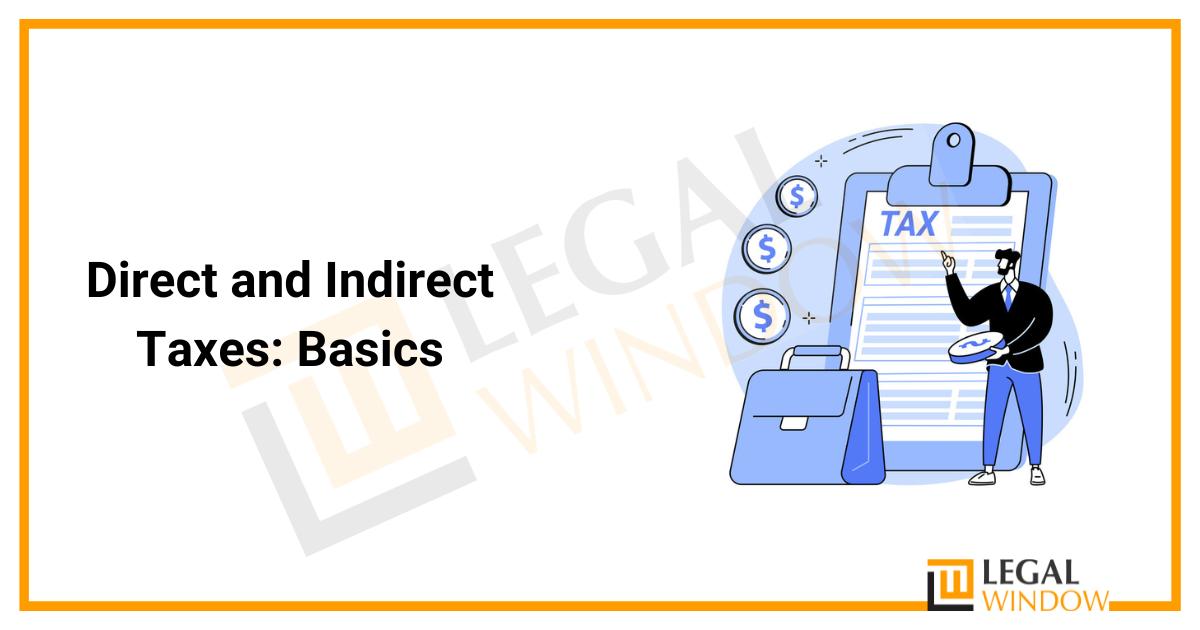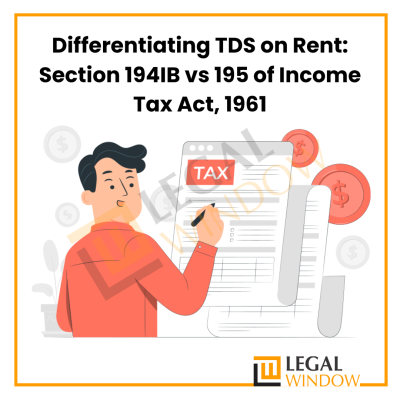 Tax is a compulsory fee that is imposed on corporations or individuals by the State and the Central Government. This fee is imposed by the authorities to invest in the growth of the economy of the country.
Tax is a compulsory fee that is imposed on corporations or individuals by the State and the Central Government. This fee is imposed by the authorities to invest in the growth of the economy of the country.
Various public expenses are covered by the Government from taxes. The concept of tax in India includes two types of taxation systems- Direct and Indirect taxes.
Let us now understand the basics of both Direct taxes and Indirect taxes.
| Table of Content |
Synopsis
Tax is one of the important sources of income for Governments. Tax is charged on regular purchases made by individuals such as: from individual’s salary, on grocery, movie tickets, meals at a restaurant, using public roads (road tax), to even simply purchasing snacks.
Paying taxes is the duty of a responsible citizen of the country. But it is equally important to be aware of different types of taxes levied on the citizens by the authorities.
Taxations in India are broadly classified into two categories- direct and indirect tax.
Direct Tax
Direct tax is directly paid to the Government authorities. For example, Income Tax is charged by the Government, and individuals directly pay it to the government. Such taxes cannot be transferred to any other person or entity.
Governing Authority
Central Board of Direct Taxes (CBDT) is responsible for the administration of direct taxes in India. This department also plans and provides inputs to the government in respect of the implementation of direct taxes.
Types of Direct Tax
Some of the common types of direct taxes that are implemented in India are as follows;
- Tax on Income: In India, the most common type of direct tax is Income Tax. It is imposed on the income of individuals and business entities that they earn within a financial year.
Income Tax is charged on the basis of income tax slabs provided by the IT department. For individual taxpayers, the IT Act provides tax deductions through various sections and provisions.
- Tax on Capital Gains: Every time an individual makes capital gains, they will be required to pay tax on such capital gains. Capital Gains are such gains that are earned from any investments or from the sale of the property.
The individuals are liable to pay either Short-Term Capital Gains (STCG tax) or Long-Term Capital Gains (LTCG tax) based on the duration for which such investments were held and on the gains from the capital. - Tax on Securities Transaction: If any individual is involved in the trading of stocks, each of such individual’s trades has a small constituent which is generally known as the Securities Transaction Tax.
The Securities Transaction tax has to be paid irrespective of whether any money was made or not from such trade. This tax is collected from the individuals by the broker. The broker then passes it on to the securities exchange, which is further paid to the government.
Advantages of Direct Tax
There are various benefits of direct taxes in India. Some of these are as follows;
- Inflation Control: The government can increase the rates of direct tax in case there is monetary inflation in the country. This further helps in reducing the demand for the goods and services and as soon as the demand for the goods and services falls, it would help in shortening inflation,
- Equitable: Direct taxes are also beneficial as they are based on the concept of equity and the concept of the progression principle. In simple words, people with high incomes have to pay higher taxes, while people with lower incomes have to pay lower taxes,
- Balances Inequalities: Governments collect higher taxes from the upper class and high-earning class of individuals to use them for launching new initiatives and programs for the upliftment of the lower class section of society.
Disadvantages of Direct Tax
Direct taxes have several benefits but they also have some drawbacks which are as follows;
- Complex process and considered a burden: Direct tax such as Income Tax is considered a burden as taxpayers are required to pay these every year in lump sums. Apart from it, the documentation procedure is also usually time-consuming and complex in nature,
- Possible Evasion: While the government has taken several steps to curb the evasion of tax, there are still various fraudulent practices through which businesses and individuals avoid paying taxes,
- Restricts Investments: A lot of individuals avoid investing due to direct tax impositions like capital gains tax and securities transaction tax. Conclusively, it can be said that direct taxes restrict investments.
Indirect Tax
While direct taxes are imposed on profits and income, on the other hand, Indirect Taxes are imposed on goods and services. One of the major differences between direct tax and indirect tax is that direct tax is directly paid to the government and indirect taxes are collected by the intermediaries.
The intermediaries, after collecting indirect tax from the end customer, then pass the received amount to the government in the form of tax.
Indirect taxes do not depend on the income or profit of an individual. The rate of tax is also the same for everyone irrespective of their economic status.
Governing Authority
The Central Board of Indirect Taxes and Customs (CBIC) is responsible for managing Indirect taxes in India. Just like the Central Board of Direct Taxes (CBDT), CBIC also reports to the Department of Revenue.
Types of Indirect Tax
Some of the important types of Indirect tax within India are as follows;
- Goods and Services Tax (GST): Seventeen different types of Indirect taxes are involved in GST. These include Central Excise, Service Tax, State Value Added Tax, and many more. It is a comprehensive indirect tax structure that is imposed on all services and goods according to the tax slabs laid by the GST council,
- Value Added Tax (VAT): A VAT is a consumption tax that is imposed on the products whenever throughout the supply chain its value increases. State Government imposes VAT. However, GST eliminated VAT but it is still imposed on several products such as alcohol-containing items,
- Customs Duty: When any individual purchases something from a foreign country and it needs to be imported, in such case the individual will be required to pay customs duty on such purchase. The purpose of imposing the custom duty is to make sure that each product that enters India is duly taxed.
Advantages of Indirect Tax
Some significant benefits of indirect taxes are as follows;
- Contribution of every citizen: It is important for a country that each individual contributes towards its development. The concept of indirect taxes ensures that even lower economic class of the society contributes towards nation-building as the poor are often exempted from paying direct taxes,
- Convenient: Direct taxes are paid lump-sum, while indirect taxes such as GST are paid in small divided amounts. Whenever an individual purchases any service or any product, a marginal amount of GST gets included in the price. This makes the payment easy, affordable, and convenient for the taxpayers,
- Easy Collection: No documentation procedure is involved in the payment of indirect taxes. The taxpayers are only required to pay the tax while purchasing a service or a product.
Disadvantages of Indirect Tax
There are several disadvantages of the Indirect tax system, which are as follows;
- Regressive Concept: Indirect taxes are considered regressive in nature as they ensure that each individual pays tax irrespective of their economic status or income. These are not equitable in nature. Individuals from every income class are required to pay indirect tax at the same rate,
- Makes Products and Services Expensive: Indirect tax is included in the price of services and goods which makes them more expensive. For example, products like bikes, cigarettes, premium cars, etc. attract a 28% tax slab within GST. So indirect taxes make the products more expensive than their value,
- Lack of transparency: Indirect tax is included in the price of service or the product itself, the consumers are usually unaware of the tax that they pay. This is contrary to direct taxes where taxpayers know the taxes that they are paying.
Difference between Direct and Indirect Tax
There are various points that differentiate between direct and indirect tax. Some of such distinguishing factors are as follows;
- Imposition: Direct tax is imposed on profits and income of individuals, while indirect tax is imposed on goods and services purchased by the individuals,
- Tax burden: Direct tax such as income tax is collected from the individuals and the burden of tax-totally falls on them. In the case of indirect taxes such as GST, the burden of tax is transferred by service providers and manufacturers to consumers,
- Taxpayer: The companies, individuals, and other entities that are taxable directly pay taxes, while indirect taxes are paid by consumers,
- Range: Only individuals or entities that earn above a particular limit are liable to pay direct taxes, while indirect taxes have comparatively larger coverage as they are imposed uniformly on each individual that purchases certain goods or services,
- Transferability: One of the major differences between direct tax and indirect taxes is that direct taxes cannot be transferred and they can only be paid by the individual themselves, while Indirect taxes such as GST can be transferred from one individual taxpayer to another,
- Inflation: Inflation is an important factor that differentiates between direct and indirect taxes as direct taxes can control inflation, while on the other hand, in the indirect tax system, a rise in taxes leads to an increase in the cost of services and goods,
- Nature: Direct tax is considered progressive tax as this is imposed according to the income of an individual, while Indirect taxes are considered regressive as everyone irrespective of their economic status or income has to pay indirect taxes.
Importance of Tax
Taxes are usually considered an unnecessary burden on individuals and entities. However, the government builds the nation, invests in healthcare, defense, and infrastructure, and launches initiatives for welfare from the taxes that are collected by them.
A country can achieve several heights globally if its citizens duly pay taxes. The Individuals must clear their tax liabilities every year and also use the tax deductions that are available to them.
The taxation system not only helps in the upliftment of society but also helps the country in becoming much more prosperous and powerful.
 Final Words
Final Words
Both indirect and direct taxes are crucial sources of earnings for the state and central governments. However, Taxation is intended to decrease in the long run.
It is also premeditated to give more space to individuals and businesses and for investment in the economy of the country.
CA Pulkit Goyal, is a fellow member of the Institute of Chartered Accountants of India (ICAI) having 10 years of experience in the profession of Chartered Accountancy and thorough understanding of the corporate as well as non-corporate entities taxation system. His core area of practice is foreign company taxation which has given him an edge in analytical thinking & executing assignments with a unique perspective. He has worked as a consultant with professionally managed corporates. He has experience of writing in different areas and keep at pace with the latest changes and analyze the different implications of various provisions of the act.
Categories
- Agreement Drafting (23)
- Annual Compliance (11)
- Change in Business (36)
- Company Law (148)
- Compliance (90)
- Digital Banking (3)
- Drug License (3)
- FEMA (17)
- Finance Company (42)
- Foreign Taxation (6)
- FSSAI License/Registration (14)
- GST (120)
- Hallmark Registration (1)
- Income Tax (202)
- Latest News (34)
- Miscellaneous (165)
- NBFC Registration (8)
- NGO (14)
- SEBI Registration (6)
- Section 8 Company (7)
- Start and manage a business (21)
- Startup/ Registration (130)
- Trademark Registration/IPR (40)
Recent Posts
About us
LegalWindow.in is a professional technology driven platform of multidisciplined experts like CA/CS/Lawyers spanning with an aim to provide concrete solution to individuals, start-ups and other business organisation by maximising their growth at an affordable cost.








